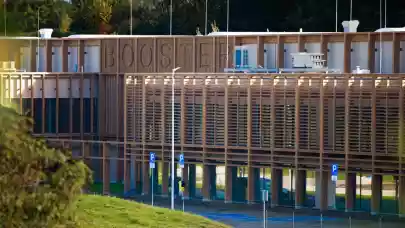
Maciej Dyjas and Nebil Șenman, Co-Owners and Managing Partners of Griffin Capital Partners, discuss their cross-sector investment model that blends private equity, real estate and financial expertise. In this interview, they outline strategic priorities across student housing, self-storage and renewable energy, explain their expansion into Germany, and share views on capital flows and investor sentiment in CEE.
This interview was originally published in Property Forum's annual "The 50 Most Influential People in Polish Real Estate" publication.
Griffin Capital Partners combines private equity, real estate, and financial sector expertise - something still rare in the Polish market. What’s the story behind this model?
Maciej Dyjas: While many players in the region focus on a single asset class, we operate across sectors, building resilient and scalable platforms. This cross-sector approach allows us to identify opportunities others might overlook - whether it's launching Poland’s first large-scale PRS platform, entering the student housing market early, or pioneering sustainable infrastructure investments. Our deep sector expertise keeps us ahead of market shifts.
Nebil Șenman: And the model works. With over €8 billion in gross asset value under management across 18 platforms, we’ve demonstrated the strength of this hybrid approach. We combine the agility of a local player with the capabilities of a global institution – a combination that continues to attract world-class partners and fuel our growth.
What are Griffin’s strategic priorities going forward, and what draws global investors like Oaktree, PIMCO, and Kajima to partner with you?
NS: The valuation of our platforms reflects not only their scale but also the depth of our expertise. Our ability to create value and grow businesses is what earns the trust of international investors - especially in a region where capital markets are still developing. Strategically, we prioritise sectors undergoing structural transformation, such as renewable energy and sustainable transport. The strength and diversity of our portfolio allow us to generate synergies, share best practices, and accelerate value creation. Global players partner with us because we offer a unique combination of deep local insight and proven global execution.
You’ve recently acquired a majority stake in Stokado. Why enter the self-storage sector now, and how do you see this market evolving in Poland and across CEE? How does the Polish self-storage market compare with more mature ones in Western Europe or the U.S.? Is there still room for rapid catch-up growth?
MD: The decision to enter the self-storage market was made well before the acquisition of Stokado in early 2023, in partnership with Redefine Properties. It followed a thorough strategic assessment and was informed by our investment experience and close monitoring of sector trends across Europe., The self-storage sector in Poland is still in its early stage of development, especially compared to more mature markets like Germany or the U.S. In these countries, self-storage services are well integrated into both the commercial real estate landscape and consumer habits. In the U.S., for example, self-storage was the best-performing real estate sector from its inclusion in the NCREIF Property Index (NPI) in 2005 through 2022. Meanwhile, in Europe, the sector continues to expand, reaching a total of around 16.5 million sqm.
NS: That figure stands in stark contrast to the average per-capita storage space in Poland, highlighting a significant opportunity for rapid growth. As urbanisation accelerates and demand for flexible, convenient storage solutions increases, Poland's relatively low market penetration puts us in a strong position. We aim to become the country’s leading self-storage operator by capitalising on this growth potential and delivering modern, user-friendly solutions at scale.
Your collaboration with Echo Investment and Signal Capital Partners on Student Space marks a major step into purpose-built student housing (PBSA). Why this asset class - and why now?
NS: Our decision to re-enter the PBSA sector in Poland is strategically timed, driven by a significant demand-supply imbalance. Poland is the fifth-largest student market in the EU, with over 1.24 million students, including more than 107,000 international students, and is an increasingly important growth driver. Yet, student housing availability remains extremely limited, with only about 10% of students having access to dormitory housing, and PBSA accounts for just 1% of this space. This creates a considerable supply gap, particularly when compared to Western Europe, where PBSA typically accounts for over 20% of student housing.
MD: Our collaboration with Signal Capital Partners, a strong financial partner, and Echo Investment, the largest Polish developer, gives us a distinct competitive advantage in addressing this gap. Together, we are building a market-leading platform capable of meeting the growing demand for modern, sustainable, and well-located student housing. Through the launch of StudentSpace, we’re well-positioned to deliver top-tier accommodation in key academic hubs - starting with Warsaw and Kraków – and to play a meaningful role in shaping the future of student living in Poland.
You made your first investment in Germany with Bauwert. What role does the German market play in your European strategy, and what conditions would support a larger rollout there?
NS: Our expansion into Germany is a deliberate and long-term component of our strategy. As Europe’s largest economy, Germany holds strategic importance for us on a personal level; both Maciej and I have strong ties to the country and a deep understanding of its market dynamics. Opening our Frankfurt office under Marcel Hertig’s leadership represents a key milestone in establishing a local presence capable of sourcing deals, building platforms, and scaling operations on the ground.
MD: This expansion not only reflects favourable market conditions and our strong interest in the region, but also marks a strategic move to secure Griffin’s on-the-ground presence. Following our acquisition of a majority stake in Bauwert and the launch of our German office, we are actively exploring other sectors where we can apply our investment model. We are well-positioned to deliver even greater value to our investors and partners.
The real estate market in 2024 showed signs of stabilisation, and investor sentiment appears to be recovering. Do you expect this trend to continue, and how might capital flows evolve in the CEE region?
MD: The CEE real estate market exhibited clear signs of stabilisation throughout 2024, and this momentum has largely continued into H1 2025. Investor sentiment is cautiously optimistic, with capital selectively returning to core markets - particularly Poland, which continues to lead in transaction volume. Logistics remains a primary driver, although supply constraints are pushing a shift toward built-to-suit and last-mile solutions. Residential demand remains strong, especially in urban centres, despite elevated financing costs.
NS: There is a notable shift toward ESG-compliant and prime assets, driven by both regulatory pressures and evolving investor priorities. Retail formats focused on convenience and daily needs are gaining momentum, while the office sector is undergoing transformation. Demand is consolidating around flexible, sustainable, and tech-enabled spaces



